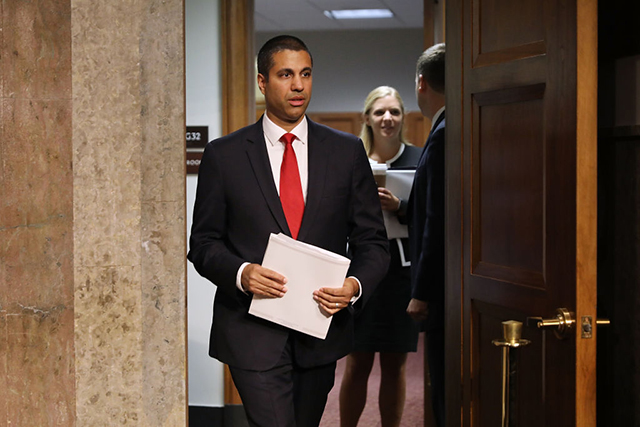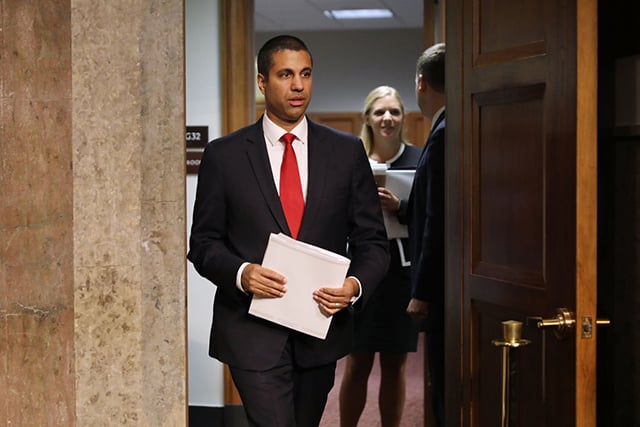
Support justice-driven, accurate and transparent news — make a quick donation to Truthout today!
 Federal Communications Commission Chairman Ajit Pai arrives for his confirmation hearing for a second term as chair of the commission before the Senate Commerce, Science and Transportation Committee in the Dirksen Senate Office Building on Capitol Hill July 19, 2017, in Washington, DC. (Photo: Chip Somodevilla / Getty Images)
Federal Communications Commission Chairman Ajit Pai arrives for his confirmation hearing for a second term as chair of the commission before the Senate Commerce, Science and Transportation Committee in the Dirksen Senate Office Building on Capitol Hill July 19, 2017, in Washington, DC. (Photo: Chip Somodevilla / Getty Images)
This story has been updated.
Congressional Democrats are requesting an internal investigation at the Federal Communications Commission into whether Ajit Pai, the FCC’s Republican chairman, has been improperly rolling back regulations to help the Sinclair Broadcasting Group secure a controversial merger that would allow the right-leaning company to reach 72 percent of the nation’s television viewers.
In a letter sent to the FCC’s inspector general on Monday, Rep. Elijah Cummings and Rep. Frank Pallone wrote that recent deregulatory moves at the GOP-controlled FCC — along with reports of a cozy relationship between Sinclair and President Trump — have raised “serious concerns about whether Chairman Pai’s actions comply with the FCC’s mandate to be independent.”
The political pressure ramped up on Wednesday when 15 Democratic senators followed up with their own letter to the FCC’s inspector general expressing “strong concerns” that the ongoing review of Sinclair’s proposed merger is “tainted.” They also sent a letter to Pai requesting that he put the review on pause while the inspector general completes his investigation, and recuse himself from voting on a proposal to repeal media ownership rules that would block the merger.
“These members of Congress have every reason to believe that there is a quid pro quo.”
Sinclair, the nation’s largest owner of TV stations, wants to acquire Tribune Media for $3.9 billion, a consolidation that would create a broadcasting behemoth controlling 233 local stations across the country. The proposed merger would easily exceed federal ownership limits and other regulations meant to keep media consolidation in check, but Pai has been busy rolling these regulations back since Trump appointed him FCC chairman earlier this year.
The FCC is scheduled to vote on a proposal to slash its broadcast media ownership rules on Thursday, a move that could clear all the remaining obstacles in the way of Sinclair’s proposed merger. These rules are designed to promote diversity in media ownership by preventing a TV broadcaster from owning a major newspaper or radio station in the same local market, for example.
“Every action [Chairman Pai] has taken with regard to media ownership has one direct beneficiary: Sinclair Broadcast Group,” said Timothy Karr, a spokesman for the media rights group Free Press that opposes the merger, in an interview. “These members of Congress have every reason to believe that there is a quid pro quo; that is to say, that favorable policies [are being traded] in exchange for favorable media coverage.”
Last December, Politico reported that the Trump campaign had “struck a deal” with Sinclair, offering its outlets more access to Donald Trump and his campaign in exchange for running Trump interviews without commentary across the country.
Trump appeared on Sinclair’s TV stations 11 times during the final months of the presidential campaign, including in key swing states, such as Ohio and Pennsylvania, according to a New York Post story cited in the lawmakers’ letters. The Post quoted two unnamed sources that said Trump met personally with David Smith, a top executive at Sinclair who supports conservative causes, and discussed rule changes at the FCC that would make the merger with Tribune Media possible. The report does not specify when the meeting took place.
“Pai’s actions have been dramatic and they have changed decades … of media policy.”
“In the proposed merger there is a blatant violation of media ownership limits, and these are rules that were put in place by Congress,” Karr told Truthout.
In August, the New York Times uncovered records showing that Smith and other Sinclair employees met with Pai to discuss deregulation as Trump was preparing for his inauguration. Soon after Trump named him chairman, Pai loosened Obama-era restrictions on revenue sharing among local broadcasting stations designed to curb media consolidation — a topic he discussed with Smith weeks earlier.
Since then, Pai and the Republican majority at the FCC have been working to clear regulatory hurdles that stand in the way of Sinclair’s proposed acquisition of Tribune Media. They even reinstated an outdated rule governing how broadcasters count different types of frequencies when reporting their area of coverage after industry analysts said it could stand in the way of Sinclair’s aggressive expansion plans, according to the lawmakers’ letter.
The day after the rule was reinstated, Sinclair announced a deal to buy a smaller media company, Bonten Media, for $240 million.
Pai has long been a supporter of deregulation, and people close to the FCC chairman have told media outlets that he is not working to benefit any particular company. Instead, they say, Sinclair and Pai simply share a common political ideology about government regulation of private businesses that use the public’s airwaves.
“Pai’s actions have been dramatic and they have changed decades … of media policy that is designed to fulfill the FCC’s main mission, which is to promote localism, competition and diversity over the public’s airwaves,” Karr said. “There is nothing in any of these proposed rule changes that supports that goal.”
However, Trump is a reality TV show host who used his ability to command the attention of television audiences to become president. He has railed against the media and threatened to use the power of the White House to undermine cable stations that air unfavorable coverage of his presidency, even threatening to block a proposed merger between AT&T and CNN over coverage he deemed to be “fake news.”
Cummings and Pallone are asking the FCC’s internal investigator to determine whether FCC actions taken under Pai’s leadership show a “pattern” of preferential treatment for Sinclair, and whether there has been any “inappropriate coordination” between Sinclair, the FCC, the White House and the Trump campaign. The lawmakers also want to know if Pai or his staff have used personal email or social media accounts to communicate with Sinclair, which could violate federal transparency laws.
The lawmakers said that before going to the inspector general, they asked Pai to answer these questions himself, but the inquiries went nowhere.
“The Chairman has repeatedly refused to adequately respond to Congressional inquiries on this subject,” the lawmakers wrote. “His refusals — contrary to his stated commitment to be responsive to all Congressional members — only increase our concerns.”
A terrifying moment. We appeal for your support.
In the last weeks, we have witnessed an authoritarian assault on communities in Minnesota and across the nation.
The need for truthful, grassroots reporting is urgent at this cataclysmic historical moment. Yet, Trump-aligned billionaires and other allies have taken over many legacy media outlets — the culmination of a decades-long campaign to place control of the narrative into the hands of the political right.
We refuse to let Trump’s blatant propaganda machine go unchecked. Untethered to corporate ownership or advertisers, Truthout remains fearless in our reporting and our determination to use journalism as a tool for justice.
But we need your help just to fund our basic expenses. Over 80 percent of Truthout’s funding comes from small individual donations from our community of readers, and over a third of our total budget is supported by recurring monthly donors.
Truthout has launched a fundraiser to add 379 new monthly donors in the next 6 days. Whether you can make a small monthly donation or a larger one-time gift, Truthout only works with your support.